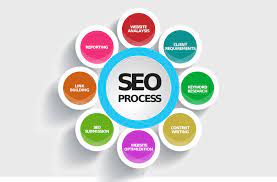The Importance of Search Engine Optimization in Digital Marketing
Search Engine Optimization (SEO) plays a crucial role in the success of any digital marketing strategy. In today’s highly competitive online landscape, having a strong SEO foundation is essential for businesses looking to improve their visibility, attract organic traffic, and drive conversions.
What is SEO?
SEO is the practice of optimizing your website and content to improve its ranking on search engine results pages (SERPs). By implementing SEO best practices, you can increase your website’s visibility and make it easier for users to find you when they search for relevant keywords.
The Benefits of SEO
- Increased Visibility: A well-executed SEO strategy can help your website rank higher on search engines, making it more likely to be seen by potential customers.
- Targeted Traffic: By targeting specific keywords related to your business, you can attract high-quality traffic that is more likely to convert into leads or sales.
- Improved User Experience: SEO involves optimizing your website for both search engines and users, leading to a better overall user experience and increased engagement.
- Cost-Effective Marketing: Compared to traditional advertising methods, SEO offers a cost-effective way to reach your target audience and drive long-term results.
Key Elements of SEO
Some key elements of SEO include keyword research, on-page optimization, technical SEO, link building, and content creation. By focusing on these aspects and staying up-to-date with the latest algorithm changes, you can improve your website’s search engine rankings and stay ahead of the competition.
The Future of SEO
As search engines continue to evolve and user behaviours change, the landscape of SEO is constantly shifting. It is important for businesses to adapt their strategies accordingly and stay informed about emerging trends in order to maintain a competitive edge in the digital marketplace.
In conclusion, search engine optimization is an integral part of any successful digital marketing strategy. By investing time and resources into improving your website’s SEO performance, you can drive organic traffic, increase conversions, and achieve long-term growth for your business.
13 Key Questions Answered: Understanding Search Engine Optimization in Digital Marketing
- What is Search Engine Optimization in digital marketing?
- What is SEO SEM in digital marketing?
- What is SEO tool in digital marketing?
- What are the 3 types of SEO optimizations?
- What is search engine marketing in digital marketing?
- What are the 5 important concepts of SEO?
- What is SEO strategy in digital marketing?
- Is search engine optimization an example of digital marketing?
- What is SEO with an example?
- Why is SEO important in digital marketing?
- What is SEO in digital marketing and its types?
- What are the 4 types of SEO?
- Is Search Engine Optimization a form of digital marketing?
What is Search Engine Optimization in digital marketing?
Search Engine Optimization (SEO) in digital marketing refers to the practice of enhancing a website’s visibility and ranking on search engine results pages (SERPs) through strategic techniques and best practices. By optimising various elements such as content, keywords, meta tags, and backlinks, SEO aims to improve a website’s organic traffic and attract relevant visitors who are actively searching for products or services related to the business. Ultimately, SEO plays a crucial role in driving online success by increasing a website’s chances of being discovered by potential customers and improving its overall performance in the competitive digital landscape.
What is SEO SEM in digital marketing?
In the realm of digital marketing, a commonly asked question revolves around the distinction between SEO and SEM. SEO, which stands for Search Engine Optimization, focuses on optimizing a website’s content and structure to improve organic search engine rankings. On the other hand, SEM, or Search Engine Marketing, encompasses paid advertising strategies to enhance a website’s visibility in search engine results pages. While SEO aims for organic growth over time, SEM provides immediate visibility through paid campaigns such as pay-per-click (PPC) advertising. Understanding the nuances between SEO and SEM is crucial for businesses looking to develop a comprehensive digital marketing strategy that maximizes their online presence and drives targeted traffic to their websites.
What is SEO tool in digital marketing?
In digital marketing, an SEO tool refers to software or online platforms designed to help businesses improve their search engine optimization efforts. These tools provide valuable insights and data that enable marketers to analyse and enhance their website’s performance in search engine results pages. SEO tools can assist in keyword research, on-page optimization, backlink analysis, site auditing, and tracking rankings. By utilising SEO tools effectively, businesses can streamline their SEO processes, identify areas for improvement, and ultimately boost their online visibility and organic traffic.
What are the 3 types of SEO optimizations?
In the realm of search engine optimization (SEO) within digital marketing, there are three primary types of optimizations that businesses often focus on to enhance their online presence and visibility. These include on-page SEO, off-page SEO, and technical SEO. On-page SEO involves optimizing individual web pages with relevant content, meta tags, and keywords to improve their search engine rankings. Off-page SEO focuses on building external links and establishing a strong online reputation through activities such as link building and social media engagement. Technical SEO, on the other hand, deals with the backend aspects of a website, ensuring that it is easily crawlable by search engines and optimized for performance. By incorporating all three types of SEO optimizations into their digital strategies, businesses can effectively boost their online visibility and attract more organic traffic.
What is search engine marketing in digital marketing?
Search engine marketing (SEM) in digital marketing refers to the practice of promoting websites by increasing their visibility in search engine results pages (SERPs) through paid advertising methods. Unlike search engine optimization (SEO), which focuses on improving organic search rankings, SEM involves using paid advertising platforms like Google Ads to bid on keywords and display ads to target audiences. SEM allows businesses to reach potential customers actively searching for products or services related to their offerings, driving targeted traffic and generating leads or sales. By strategically utilising SEM techniques, businesses can enhance their online presence, increase brand awareness, and achieve specific marketing objectives effectively in the competitive digital landscape.
What are the 5 important concepts of SEO?
Understanding the five important concepts of SEO is essential for anyone looking to enhance their digital marketing strategy. These concepts include keyword research, on-page optimization, technical SEO, link building, and content creation. Keyword research helps identify relevant terms that users search for, while on-page optimization involves optimizing website elements like title tags and meta descriptions. Technical SEO focuses on improving site performance and structure, while link building aims to increase the authority of a website. Lastly, content creation involves producing high-quality, relevant content that engages users and aligns with search engine algorithms. Mastering these key concepts can significantly impact a website’s visibility and performance in search engine results pages.
What is SEO strategy in digital marketing?
An SEO strategy in digital marketing refers to a comprehensive plan designed to improve a website’s visibility and rankings on search engine results pages (SERPs). It involves a range of tactics and techniques aimed at optimising website content, improving site structure, and building high-quality backlinks to attract organic traffic. A well-defined SEO strategy typically includes keyword research, on-page optimization, technical SEO enhancements, content creation, and ongoing monitoring and analysis to ensure continuous improvement in search engine performance. By implementing an effective SEO strategy, businesses can enhance their online presence, reach their target audience more effectively, and ultimately drive valuable traffic and conversions to their website.
Is search engine optimization an example of digital marketing?
Yes, search engine optimization (SEO) is indeed an integral component of digital marketing. SEO involves optimising a website’s content, structure, and performance to improve its visibility on search engine results pages. By strategically implementing SEO techniques such as keyword research, on-page optimisation, and link building, businesses can enhance their online presence and attract organic traffic. In the broader context of digital marketing, SEO plays a crucial role in driving targeted traffic, increasing brand awareness, and ultimately achieving marketing objectives through improved search engine rankings.
What is SEO with an example?
Search Engine Optimization (SEO) is the process of enhancing a website’s visibility on search engine results pages (SERPs) through organic, non-paid methods. Essentially, SEO involves optimizing various aspects of a website to improve its ranking for specific keywords that users are searching for. For example, let’s consider a local bakery in London that wants to attract more customers through its website. By implementing SEO strategies such as keyword research, on-page optimization, and local SEO techniques, the bakery can improve its online visibility when users search for terms like “best bakery in London” or “freshly baked pastries near me.” This increased visibility can drive more organic traffic to the bakery’s website and ultimately lead to more foot traffic and sales at their physical location.
Why is SEO important in digital marketing?
Search Engine Optimization (SEO) is crucial in digital marketing because it helps businesses improve their online visibility and attract targeted traffic. By implementing SEO best practices, businesses can enhance their website’s ranking on search engine results pages, making it easier for potential customers to find them when searching for relevant keywords. SEO not only drives organic traffic to websites but also improves user experience, boosts credibility, and ultimately leads to higher conversion rates. In today’s competitive online landscape, having a strong SEO strategy is essential for businesses looking to establish a strong online presence and stay ahead of the competition.
What is SEO in digital marketing and its types?
Search Engine Optimization (SEO) in digital marketing refers to the practice of optimizing a website and its content to improve its visibility on search engine results pages (SERPs). SEO aims to increase organic traffic by ranking higher for relevant keywords that users search for. There are two main types of SEO: on-page SEO and off-page SEO. On-page SEO involves optimizing elements such as content, meta tags, and internal links within the website itself. Off-page SEO, on the other hand, focuses on building external links and establishing the website’s authority and credibility across the web. Both types of SEO work together to enhance a website’s visibility, attract targeted traffic, and improve overall search engine rankings.
What are the 4 types of SEO?
In the realm of search engine optimization (SEO) in digital marketing, understanding the four main types of SEO is crucial for developing a comprehensive strategy to improve online visibility and attract organic traffic. The four types of SEO include on-page SEO, off-page SEO, technical SEO, and local SEO. On-page SEO focuses on optimizing individual web pages with relevant content, meta tags, and keywords to improve search engine rankings. Off-page SEO involves building quality backlinks from external websites to enhance domain authority and credibility. Technical SEO deals with the technical aspects of a website, such as site speed, mobile-friendliness, and structured data markup. Local SEO targets local search queries to help businesses appear in geographically relevant searches. By incorporating these different types of SEO into a holistic approach, businesses can maximise their online presence and reach their target audience effectively.
Is Search Engine Optimization a form of digital marketing?
Search Engine Optimization (SEO) is indeed a fundamental component of digital marketing. While SEO focuses on improving a website’s visibility and ranking on search engine results pages through organic means, it is closely intertwined with digital marketing strategies. By optimising website content, meta tags, and other elements for search engines, businesses can enhance their online presence and attract targeted traffic. SEO plays a crucial role in driving organic traffic to websites, increasing brand visibility, and ultimately contributing to the overall success of digital marketing campaigns.


